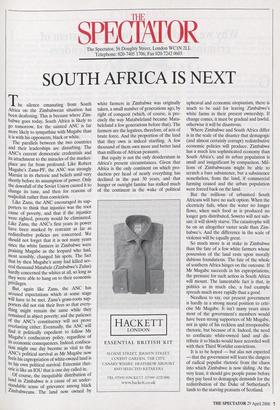SPECTAT THE OR
The Spectator, 56 Doughty Street, London WC1N 2LL Telephone: 020-7405 1706; Fax 020-7242 0603
SOUTH AFRICA IS NEXT
The silence emanating from South Africa on the Zimbabwean situation has been deafening. This is because where Zim- babwe goes today, South Africa is likely to go tomorrow, for the sainted ANC is far more likely to sympathise with Mugabe than it is with his opponents, black or white. The parallels between the two countries and their leaderships are disturbing. The ANC's current democratic credentials and Its attachment to the miracles of the market- place are far from profound. Like Robert Mugabe's Zanu-PF, the ANC was strongly Marxist in its rhetoric and beliefs until very shortly before its assumption of power. Only the downfall of the Soviet Union caused it to change its tune, and then for reasons of rea/po/itik rather than conviction.
Like Zanu, the ANC encouraged its sup- porters to think that injustice was the root cause of poverty, and that if the injustice were righted, poverty would be eliminated. Like Zanu, the ANC's first years in power have been marked by restraint as far as redistributive policies are concerned. We should not forget that it is not many years since the white farmers in Zimbabwe were Praising Mugabe as the leopard who had, most sensibly, changed his spots. The fact that by then Mugabe's army had killed sev- eral thousand Matabele (Zimbabwe's Zulus) hardly concerned the whites at all, so long as they were able to hang on to their economic Privileges. But, again like Zanu, the ANC has aroused expectations which at some stage MU have to be met. Zanu's grass-roots sup- Porters did not risk their lives so that every- thing might remain the same while they remained in abject poverty; and the patience of the ANC's constituency will not prove everlasting either. Eventually, the ANC will find it politically expedient to follow Mr Mugabe's confiscatory policy, regardless of its economic consequences. Indeed, confisca- hon might one day become as vital to the ANC's political survival as Mr Mugabe now feels his expropriation of white-owned land is to his own political survival. Extremist rhet- °Ile is like an IOU that is one day called in.
Of course, the inequitable distribution of 'and in Zimbabwe is a cause of an under- standable sense of grievance among black Zimbabweans. The land now owned by white farmers in Zimbabwe was originally taken, a small number of generations ago, by right of conquest (which, of course, is pre- cisely the way Matabeleland became Mata- beleland a few generations before that). The farmers are the legatees, therefore, of acts of brute force. And the proportion of the land that they own is indeed startling. A few thousand of them own more and better land than millions of African peasants.
But equity is not the only desideratum in Africa's present circumstances. Given that Africa is the only continent on which pro- duction per head of nearly everything has declined in the past 30 years, and that hunger or outright famine has stalked much of the continent in the wake of political upheaval and economic utopianism, there is much to be said for leaving Zimbabwe's white farms in their present ownership. If change comes, it must be gradual and lawful, otherwise it will be disastrous.
Where Zimbabwe and South Africa differ is in the scale of the disaster that demagogic (and almost certainly corrupt) redistributive economic policies will produce. Zimbabwe has a much less sophisticated economy than South Africa's, and its urban population is small and insignificant by comparison. Mil- lions of Zimbabweans might be able to scratch a bare subsistence, but a subsistence nonetheless, from the land, if commercial farming ceased and the urban population were forced back on the land.
But the millions of urbanised South Africans will have no such option. When the electricity fails, when the water no longer flows, when such food as is produced no longer gets distributed, Soweto will not sub- sist: it will slowly starve. The catastrophe will be on an altogether vaster scale than Zim- babwe's. And the difference in the scale of violence will be equally great.
So much more is at stake in Zimbabwe than the fate of a few white farmers whose possession of the land rests upon morally dubious foundations. The fate of the whole of southern Africa hinges on the outcome. If Mr Mugabe succeeds in his expropriations, the pressure for such action in South Africa will mount. The lamentable fact is that, in politics as in much else, a bad example spreads much more rapidly than a good.
Needless to say, our present government is hardly in a strong moral position to criti- cise Mr Mugabe. It isn't many years since most of the government's members would have been strong supporters of Mr Mugabe, not in spite of his reckless and irresponsible rhetoric, but because of it. Indeed, the need to confiscate white-owned land and dis- tribute it to blacks would have accorded well with their Third Worldist convictions.
It is to be hoped — but alas not expected — that the government will learn the dangers of radical populist rhetoric from the chaos into which Zimbabwe is now sliding. At the very least, it should give people pause before they pay heed to demagogic demands for the redistribution of the Duke of Sutherland's lands to the starving peasants of Scotland.


























































 Previous page
Previous page